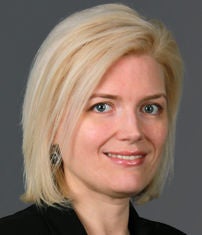Britt Miller, Partner-in-Charge of Mayer Brown's Chicago office, shares insights on the advancement of female attorneys and advice for younger associates.
Mayer Brown announced last month that it appointed Britt Miller as the partner-in-charge of the firm’s Chicago office. Ms. Miller is succeeding Rebecca Eisner, who previously headed up the Chicago office since 2015, and still holds a leadership role on Mayer’s Global Management Committee.
Even though women graduate from law school in equal numbers as men. Studies such as NAWL’s annual Survey on Retention and Promotion of Women in Law highlight that women make up 20 percent of equity partners and office-level managing partners in Am Law Firms.
Britt Miller was kind enough to share with the NLR some insights on how she was able to navigate the legal industry’s uphill climb for female attorneys and advance within one firm rather than switching firms.
The NLR: Mayer Brown’s advancement of women partners is exceptional especially in the Chicago office which is the largest of the firm, with more than 300 attorneys, and has had back to back female leaders. Is there anything unique in the culture of the Chicago office, which makes it easier for female attorneys to advance?
Ms. Miller: I don’t know that I would call either Rebecca’s or my career paths “easy,” but I do believe that the Firm has a culture that allows attorneys to chart their own paths and be themselves and one that rewards excellence. Advancement is part effort, part opportunity. Yes, you have to put in the time and effort (and produce excellent work product), but you also have to be given the opportunity to speak up, offer your opinion (and know that it is valued), try new things, step outside your comfort zone, take a chance, make mistakes (and know they will be forgiven), ask for help (and not be made to feel weak for doing so), and feel supported – both in your practice and in your life. I think that Mayer Brown, and the people that I have worked with over the years, have made those opportunities—and so many others—available to me.
The NLR: According to the NALP Foundation’s 2017 Update on Associate Attrition, 44 percent of associates leave their firms after being there for three years. You’ve spent your entire legal career at Mayer Brown, which is somewhat unique these days with the waves of lateral moves, why did you find it more beneficial to stay at one firm?
Ms. Miller: I wanted the Firm to invest in me and so I thought it only fair that I invest in it; and it paid off. Some people say that I took the easy path by staying at one firm so long, but I don’t see it that way. It’s actually harder to stay.
The NLR: Any advice for young female associates on steps to take early in their careers which will help them later on when they are looking to advance within their firms?
Ms. Miller: The first few years of practice are critical – of course, you are learning to practice law in the “real world,” but this is the time that you likely will form a number of your mentor relationships and other’s opinions of you will form relatively quickly. Put your best foot forward and demonstrate that you are someone senior associates, counsel and partners can rely upon – it will only inure to your benefit. Also, look around. Not everyone in your starting class will still be there by the time you are considered for partner, but they may move on to work in-house or move to another firm. The friend you make as a first year, may be your client or a source of referrals in your 8th year.
The NLR: Law schools and law firms are frequently criticized for not preparing young lawyers on how to build a law practice, any advice for attorneys early in their careers on how to start building a client base?
Ms. Miller: “Building a practice” or “business development” is not intuitive and it’s not something that they teach you in law school or in first year orientation. But there also isn’t some secret handbook to successful business development that all of the partners at your firm have but just aren’t willing to share with you, and it’s not a one-size-fits-all undertaking. What worked for partner “x” may not work for you. And what works for you may not work for the next associate. You have to figure out what works for you. But don’t hide in your office or bury your face in your computer; personal interaction—with your colleagues (who may become clients), with clients, and with others in the business community—is critical. Clients want to know who they are entrusting with their case or deal.
 Britt Miller is the co-leader of Mayer Brown’s global Antitrust & Competition practice, representing corporations in price-fixing, market allocation, monopolization and conspiracy cases. Miller also leads many of the firm’s pro bono projects, including the recent work to reunite a Brazilian migrant mother with her 10-year-old son in Chicago. (CNN)
Britt Miller is the co-leader of Mayer Brown’s global Antitrust & Competition practice, representing corporations in price-fixing, market allocation, monopolization and conspiracy cases. Miller also leads many of the firm’s pro bono projects, including the recent work to reunite a Brazilian migrant mother with her 10-year-old son in Chicago. (CNN)




 />i
/>i

